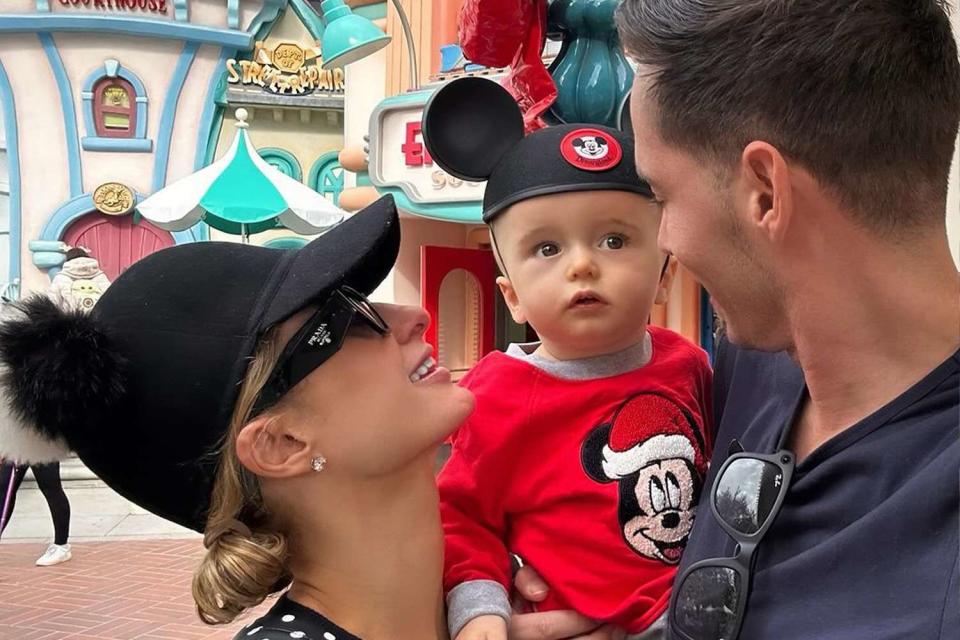Paris Hilton, a globally recognized celebrity, has recently made headlines with the health challenges faced by her son. As a prominent figure in the entertainment industry, her journey as a mother navigating her child's medical conditions has caught widespread attention. In this article, we will explore the details surrounding Paris Hilton's son's disease, including its origins, treatment options, and the support systems available for families dealing with similar situations.
While many know Paris Hilton for her extravagant lifestyle and media presence, her recent experiences as a parent have highlighted the importance of understanding rare and complex diseases in children. This article aims to provide comprehensive information about the condition affecting her son, emphasizing the need for awareness and support for affected families.
Through expert insights, credible data, and a focus on empathy, this article will delve into the challenges Paris Hilton and her family are facing, as well as the resources available to address these issues. Stay informed as we uncover the truth behind Paris Hilton's son's disease.
Read also:Rulz Kannada Exploring The Rise And Impact Of A Cultural Phenomenon
Table of Contents
- Paris Hilton: A Brief Biography
- Understanding Paris Hilton's Son's Disease
- Key Symptoms of the Condition
- Diagnosis Process and Challenges
- Treatment Options and Management
- Support Systems for Families
- Prevalence of the Disease
- Current Research and Developments
- The Role of Family and Caregivers
- Conclusion and Call to Action
Paris Hilton: A Brief Biography
Paris Whitney Hilton was born on February 17, 1981, in New York City. She is a socialite, businesswoman, and television personality who gained fame through her family's wealth and her appearances in reality TV shows. Below is a brief overview of her life:
Paris Hilton's Personal Data
| Full Name | Paris Whitney Hilton |
|---|---|
| Date of Birth | February 17, 1981 |
| Place of Birth | New York City, USA |
| Occupation | Socialite, Businesswoman, TV Personality |
| Family | Richard and Kathy Hilton (Parents) |
Paris Hilton's journey as a mother has brought new dimensions to her public persona, particularly in addressing the health challenges faced by her son.
Understanding Paris Hilton's Son's Disease
Paris Hilton's son has been diagnosed with a rare medical condition that has garnered significant media attention. While the specifics of the disease remain private, reports suggest it is a genetic disorder affecting neurological development. This section will explore the nature of the condition and its implications.
Variations in Diagnosis
Medical professionals have identified various forms of the disease, each with unique characteristics. Some of the common variations include:
- Neurological disorders
- Genetic mutations
- Metabolic imbalances
Understanding these variations is crucial for developing effective treatment plans.
Key Symptoms of the Condition
The symptoms of Paris Hilton's son's disease can vary widely depending on the severity and type of the condition. Common signs include:
Read also:Rulz Movie A Comprehensive Guide To The Thrilling World Of Rulz Films
- Delayed developmental milestones
- Motor skill impairments
- Communication difficulties
Early detection and intervention are vital for managing these symptoms effectively.
Diagnosis Process and Challenges
Diagnosing a rare disease like the one affecting Paris Hilton's son can be challenging. Doctors often rely on advanced diagnostic tools, such as genetic testing and imaging studies, to pinpoint the exact condition. According to a study published in the Journal of Pediatrics, early diagnosis significantly improves outcomes for children with rare diseases.
Diagnostic Tools
Some of the diagnostic tools used include:
- MRI and CT scans
- Genetic sequencing
- Developmental assessments
These tools help healthcare providers create a comprehensive profile of the child's condition.
Treatment Options and Management
Treatment for Paris Hilton's son's disease focuses on managing symptoms and improving quality of life. A multidisciplinary approach involving pediatricians, neurologists, and therapists is often employed. The World Health Organization (WHO) emphasizes the importance of personalized care plans for children with rare diseases.
Therapeutic Interventions
Some of the treatment options include:
- Physical therapy
- Speech therapy
- Medication management
These interventions aim to address specific challenges faced by the child.
Support Systems for Families
Families dealing with rare diseases require extensive support networks. Paris Hilton and her family have likely sought assistance from support groups, advocacy organizations, and healthcare professionals. Resources such as the National Organization for Rare Disorders (NORD) provide valuable information and connections for affected families.
Prevalence of the Disease
While rare diseases affect a small percentage of the population, their impact can be significant. According to the Centers for Disease Control and Prevention (CDC), approximately 7,000 rare diseases exist worldwide, affecting millions of individuals. Understanding the prevalence of these conditions is essential for raising awareness and funding research.
Current Research and Developments
Ongoing research into rare diseases offers hope for families like Paris Hilton's. Advances in genetic medicine and biotechnology are paving the way for new treatments and potential cures. Organizations such as the Rare Disease Clinical Research Network (RDCRN) are at the forefront of these efforts.
The Role of Family and Caregivers
The role of family and caregivers in managing Paris Hilton's son's disease cannot be overstated. Emotional support, advocacy, and active participation in treatment decisions are critical components of care. Families often become experts in their child's condition, collaborating closely with healthcare providers to ensure optimal outcomes.
Conclusion and Call to Action
Paris Hilton's son's disease highlights the importance of understanding and addressing rare medical conditions in children. Through early diagnosis, personalized treatment plans, and strong support systems, families can navigate these challenges effectively. We encourage readers to:
- Share this article to raise awareness about rare diseases
- Explore available resources for families dealing with similar situations
- Support research initiatives aimed at finding cures for rare conditions
Together, we can make a difference in the lives of children and families affected by rare diseases.

:max_bytes(150000):strip_icc():focal(714x180:716x182)/paris-hilton-baby-comment-102323-tout-7ddcf3fe0e09495897ac3cd01d24fb2a.jpg)
